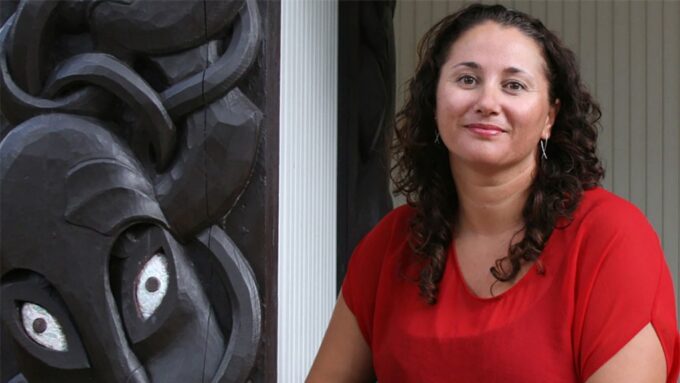
Prof Melinda Webber
Faculty Dean Professor Mark Barrow is delighted with the high number of promotions this year, in discipline areas which span Māori student student motivation and engagement, early childhood studies, leadership in education and refugee studies.
“This is a wonderful achievement for our new professors, the faculty and the University, and testament to their incredibly hard work, high professional standards and quality research. I wish them warmest congratulations.”
Melinda is Te Tumu – Deputy Dean, Te Kura Akoranga me te Tauwhiro Tangata, Waipapa Taumata Rau. She is of Ngāti Hau, Ngāti Kahu, Ngāpuhi and Ngāti Whakaue descent and teaches and researches in Te Puna Wānanga: the School of Māori and Indigenous Education in the Faculty of Education and Social Work.
She has been the recipient of a number of prestigious research awards including a Rutherford Discovery Fellowship, Marsden Grant, a Teaching and Learning Research Initiative (TLRI) grant, and a Ngā Pae o te Maramatanga Te Pae Tawhiti grant.
Melinda also leads a number of research projects focused on better understanding the effects of Māori student motivation and academic engagement, culturally sustaining teaching and school leadership, localised curricula, and enduring school-family-community partnerships for learning.
Marek is currently Head of School of Learning Development and Professional Practice, and the Associate Dean International at the Faculty of Education and Social Work. He has expertise in early childhood education (ECE) and childhood studies, philosophy of education, educational theory and innovative methodologies.
He weaves these areas together in his scholarship to enhance ECE for young children and their families in both Aotearoa New Zealand and internationally. Marek is globally known for his work championing children’s voice and child-first philosophies in research and practice. He has published extensively in international journals, edits four educational book series and is editor of six academic journals, as well as sitting on more than 20 international editorial boards.
He leads two esteemed, international learned societies as chair of the steering committee of the Reconceptualizing Early Childhood Education (RECE), and elected president of the Philosophy of Education Society of Australasia (PESA).
And in 2021 he founded the Centre for Global Childhoods at the University of Auckland, which has a mission to be a world-leading, interdisciplinary research centre for the study of global childhoods and the early years.
Deidre began her career teaching in primary and secondary schools in New Zealand and England. She completed her PhD at the University of Michigan in 2003 before moving to Washington State University where she worked as an assistant professor.
Since returning to New Zealand, Deidre has developed and led graduate programmes in educational leadership at the University of Auckland.
Her research and teaching interests have grown and changed over the years. However what has remained central has been supporting leaders and teachers to solve complex problems in ways that can have a positive impact on young people, their families, schools, communities and larger society.
She collaborates with practitioners in education and in other professional fields, such as medicine, developing effective professional learning initiatives and supporting organisational change for improvement.
Deidre has published extensively on interpersonal effectiveness, leadership, educational improvement, organisational change, and effective professional learning. She enjoys the challenges of working to understand the complexities in learning, teaching, leadership and change in her work in New Zealand and internationally.
Born in the mountains of North Carolina, Jay discovered his interest in forced migration studies after working with homeless children and raising money to provide their schooling in Guatemala, 20 years ago.
Meeting his future wife there, he eventually found his way to New Zealand after community development roles in Ecuador and working as a social work practitioner and researcher with refugees in Australia and Aotearoa.
Jay’s research in refugee studies on settlement policy and integration, the maintenance of transnational lives, and disaster risk reduction has achieved national and international eminence with more than 80 publications. It has also secured numerous external grants exceeding $6 million, including a Rutherford Discovery Fellowship, Marsden Fast Start, National Science Challenges, and Marie Curie.
Building from these activities, he co-founded and co-directs the Centre for Asia Pacific Refugee Studies (2020). His commitment to high quality, innovative and inclusive teaching has been recognised by teaching excellence awards at the national (2017), University (2014) and faculty (2013) level.
He has co-published 21 articles with 15 postgraduate students and 22 refugee background scholars. He has also advocated to make refugee-background students an equity group at the University (2013) up to present, and sits and on several boards for NGOs that provide services to people from refugee backgrounds.
The much-delayed English draft curriculum is now out for consultation, generating discussion from teachers.
Research from AUT demonstrates arts, culture and recreation have positive impacts on all aspects of…
How effective has the school phone ban been in achieving its aims? Researchers from the…
School camps and excursions deliver hands on learning experiences, helping to consolidate classroom learning.
Innovations in AV technologies present new opportunities to engage with students. We look at how…
A new report from the University of Auckland’s Our Voices Project asks young people what…
This website uses cookies.